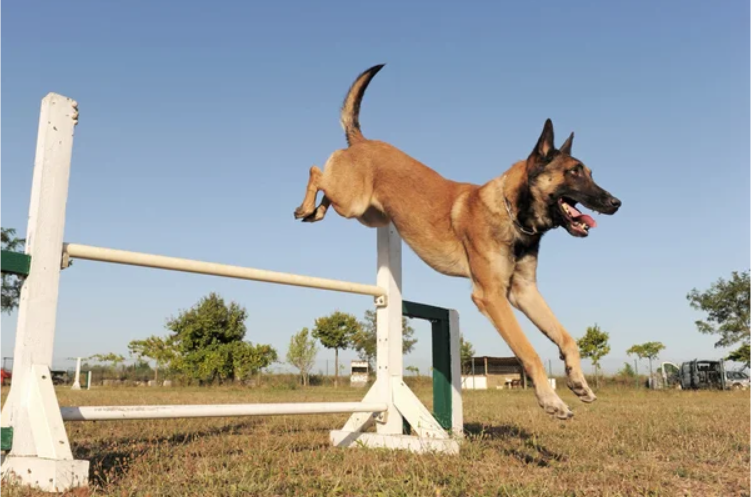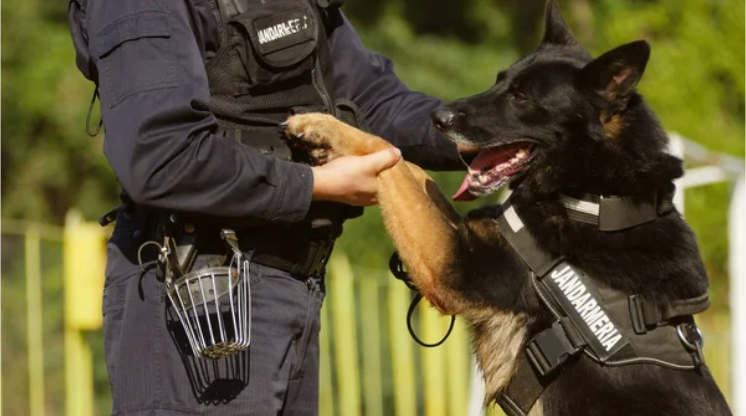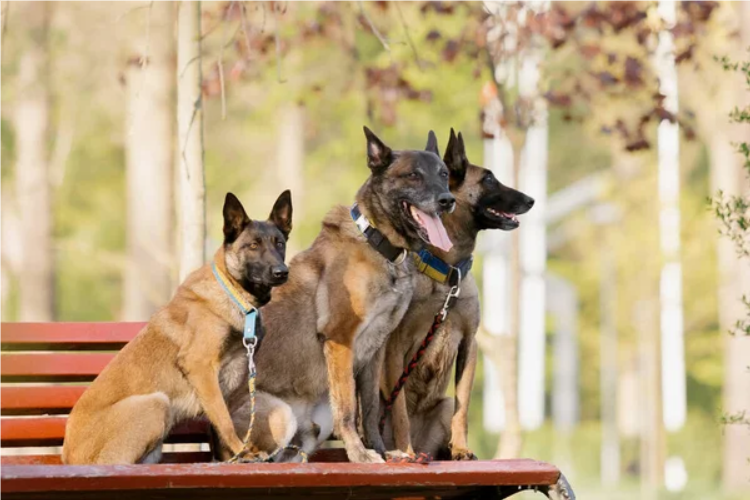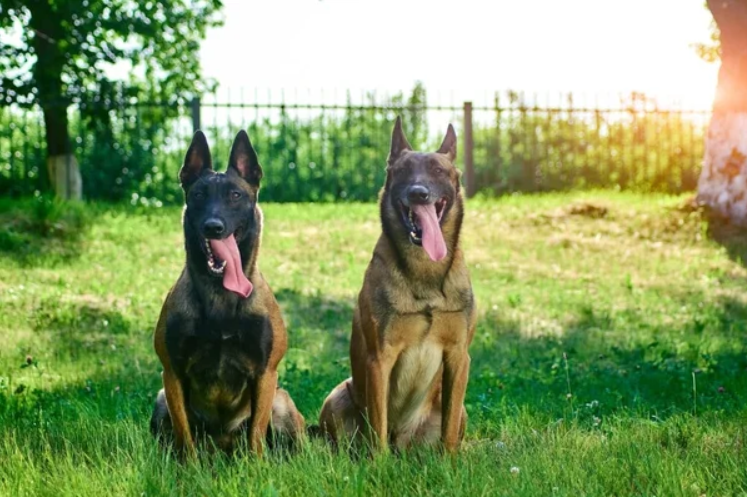When it comes to ensuring the safety and security of your loved ones and property, investing in a personal protection dog can be a wise decision. Protection dogs, also known as guard dogs, are specially trained canines that possess the skills and temperament necessary to deter potential threats and keep their owners out of harm’s way.
Scott’s K9 excels in providing top-tier protection dogs that meet these critical standards. With extensive experience and a reputation for excellence, Scott’s K9 ensures each dog is trained to be a reliable and effective guardian. Our expertise guarantees that you will receive a protection dog with the right qualities to safeguard your family and property.
This guide will explore the top 5 qualities that make a protection dog exceptional. We will leverage Scott’s K9’s expertise to help you understand what to look for when selecting your new four-legged guardian, ensuring you make an informed and confident choice.
1. Stable Temperament
When searching for the ideal protection dog, the first and most critical quality to consider is a stable temperament. A dog with a balanced disposition is the foundation upon which all other traits are built.
Good guard dogs are confident, alert, and even-tempered, displaying neither excessive aggression nor timidity. They possess the emotional stability to handle the challenges and stresses that come with their protective role, making them more reliable and predictable in their behavior.
Identifying a Stable Temperament
So, how can you spot a dog with a stable temperament? When evaluating a potential protection dog, pay close attention to their body language and reactions to various stimuli. A dog with a stable temperament will:
- Remain calm and composed in new or unfamiliar situations
- Show curiosity and confidence when meeting new people or animals
- Respond appropriately to commands and corrections
- Display a willingness to engage with their environment without excessive fear or aggression
The Importance of Early Socialization
It’s worth noting that while some dogs may have a naturally stable temperament, proper socialization during puppyhood plays a crucial role in shaping a well-balanced adult dog. Responsible breeders and trainers of protection dogs understand the importance of exposing their puppies to a wide variety of people, animals, and environments during their critical developmental stages. This early socialization helps ensure that the dog grows up to be confident, adaptable, and emotionally stable, making them better suited for the demands of guard dog work.
The Role of Genetics in Temperament
In addition to early socialization, genetics also play a significant role in a dog’s temperament. Reputable breeders of protection dogs carefully select breeding stock with stable temperaments to increase the likelihood of producing puppies with the desired traits.
When selecting a protection dog, it’s essential to choose a puppy from a reputable breeder who prioritizes temperament in their breeding program and can provide information about the temperaments of the puppy’s parents and other relatives.
Read More: The Top Reasons To Consider A Protection Dog For Your Security Needs
2. High Trainability

Another essential quality to look for in a protection dog is high trainability. A dog’s ability to learn and respond to commands consistently is the cornerstone of effective guard dog security. Good protection dogs must be able to understand and execute a wide range of commands, from basic obedience to advanced protective tasks. Dogs with a strong desire to learn and please their handlers are more likely to excel in the rigorous training required for protection work.
Recognizing a Highly Trainable Dog
When assessing a dog’s trainability, consider the following traits:
- Eagerness to engage with their handler and learn new tasks
- Quick understanding and retention of commands
- Willingness to work for rewards, such as praise, treats, or toys
- Ability to focus and maintain attention despite distractions
The Role of Breed and Genetics
While any dog can be trained to some extent, certain breeds are known for their high trainability and are often favored for protection work. German Shepherds and Belgian Malinois are among the most popular guard dog breeds, thanks to their intelligence, work ethic, and adaptability.
However, it’s important to remember that even within these breeds, individual dogs may vary in their trainability. Genetics play a significant role in a dog’s ability to learn and retain information, so it’s essential to work with reputable breeders who prioritize these traits in their breeding programs.
Training Methods for Protection Dogs
Training a protection dog requires a unique approach that differs from traditional obedience training. Protection dog training typically involves a combination of obedience, agility, and scenario-based training to prepare the dog for real-world situations. Positive reinforcement techniques, such as rewarding the dog with praise, treats, or toys for desired behaviors, are often used to encourage learning and maintain the dog’s enthusiasm for training.
It’s crucial to work with an experienced trainer who understands the complexities of training personal protection dogs and can tailor the program to your dog’s individual needs and temperament. A skilled trainer will also be able to teach you how to handle and maintain your personal protection dog‘s training over time.
3. Physical Fitness and Health
In addition to mental and emotional qualities, the physical fitness and health of your guard dog are paramount. Protection dogs must be physically capable of performing their duties, which often involve extended periods of activity, quick bursts of speed, and the ability to confront and subdue potential threats. A good guard dog should have a strong, athletic build that allows them to move with ease and endurance.
Evaluating Physical Fitness and Health
When selecting a protection dog, look for the following physical attributes:
- A muscular, athletic build appropriate for their breed and size
- Good cardiovascular endurance and stamina
- Absence of genetic health issues or physical limitations that could hinder their protective abilities
- Regular veterinary check-ups and a comprehensive health history
Breed Considerations for Physical Prowess
Certain guard dog breeds are known for their impressive physical capabilities. For example, German Shepherds and Belgian Malinois are renowned for their strength, agility, and endurance, making them well-suited for demanding protection work. When choosing a breed for your protection dog, consider their physical traits and how they align with your specific needs and lifestyle.
The Importance of Physical Conditioning and Maintenance
Maintaining your protection dog‘s physical fitness is an ongoing responsibility. Regular exercise, a balanced diet, and routine veterinary care are essential components of keeping your guard dog in peak physical condition. Engaging your dog in activities that challenge their strength, endurance, and agility, such as hiking, swimming, or obstacle courses, can help maintain their physical prowess and mental stimulation.
It’s also important to be aware of any breed-specific health concerns and to work closely with your veterinarian to prevent or manage any potential issues. By prioritizing your protection dog‘s physical health and fitness, you ensure that they are always ready and able to perform their duties when called upon.
4. Strong Bonding and Loyalty

One of the most crucial aspects of a successful protection dog is the deep, unbreakable bond they share with their handler. This connection is the foundation of trust, communication, and cooperation between the dog and their human partner. A good guard dog should have a strong sense of loyalty to their family and a desire to please their handler. When a dog is deeply bonded to their owner, they are more likely to respond reliably to commands, even in high-stress situations, and will be more motivated to protect their loved ones. For those seeking such companionship, there are protection trained dogs for sale that come with these essential qualities.
Cultivating a Strong Bond with Your Protection Dog
Building a strong bond with your protection dog requires time, patience, and consistency. To foster this connection:
- Spend ample time engaging in positive interactions, such as play, training, and relaxation
- Be consistent in your communication and expectations
- Provide regular mental and physical stimulation to keep your dog engaged and fulfilled
- Show affection and praise for good behavior and obedience
The Importance of Socialization and Positive Reinforcement
Socialization and positive reinforcement play vital roles in developing a strong bond with your guard dog. By exposing your dog to a variety of people, animals, and environments, you help them build confidence and trust in your leadership.
Positive reinforcement, such as rewarding your dog with praise, treats, or playtime for good behavior, strengthens your bond and encourages your dog to continue following your commands. Remember, a loyal and devoted protection dog is not born overnight; it is the result of consistent, loving training and a commitment to building a lifelong partnership.
The Role of Handler Consistency and Leadership
Consistency and strong leadership are essential components of building a strong bond with your protection dog. Dogs thrive on predictability and clear expectations, so it’s crucial to establish and maintain consistent rules, boundaries, and consequences in your relationship with your dog. As the handler, you must also demonstrate calm, assertive leadership, providing your dog with the guidance and direction they need to succeed in their role.
Inconsistent or confusing communication can undermine your bond with your guard dog and lead to behavioral issues or a lack of trust. By being a consistent, reliable leader, you give your dog the confidence and security they need to focus on their protective duties and maintain their loyalty to you and your family.
5. Courage and Protective Instincts
At the heart of every good protection dog lies an unwavering courage and a strong instinct to protect their family. These qualities are what set protection dogs apart from other canine companions. A guard dog must possess the bravery to face and confront potential threats, even in the face of danger. This innate courage, combined with a deep-seated desire to keep their loved ones safe, is what allows protection dogs to excel in their role as guardians.
Identifying Courage and Protective Instincts
When evaluating a dog’s courage and protective instincts, look for the following characteristics:
- Confidence and assertiveness in new or challenging situations
- Willingness to stand their ground and confront perceived threats
- Strong desire to maintain proximity to their handler and family members
- Protective body language, such as alert posture and focused attention on potential threats
Breed and Training Considerations
Belgian Malinois and German Shepherds security dogs, are known for their natural protective instincts and courage. However, it’s crucial to remember that these traits must be nurtured and channeled through proper training. A responsible protection dog trainer will work to develop a dog’s natural instincts while ensuring that they remain under control and responsive to commands. Without proper training, a dog’s courage and protective instincts can become a liability, leading to overly aggressive or unpredictable behavior.
Selecting Your Ideal Protection Dog

Now that we’ve explored the top 5 qualities to look for in a protection dog, it’s essential to consider your unique needs and lifestyle when making your selection. Ask yourself the following questions:
- What specific threats or challenges do you need your guard dog to address?
- How much time and energy can you dedicate to training and caring for your protection dog?
- What is your living situation, and how will your guard dog fit into your daily routine?
- Are there any breed restrictions or legal considerations in your area?
By answering these questions honestly, you can narrow down your options and find a protection dog that aligns with your requirements and capabilities.
Working with Reputable Breeders and Trainers
Once you have a clear idea of what you’re looking for in a protection dog, it’s crucial to work with reputable breeders and trainers who specialize in producing and training high-quality guard dogs.
Look for professionals who prioritize the health, temperament, and trainability of their dogs, and who can provide references and documentation of their dogs’ abilities. A responsible breeder or trainer will take the time to understand your needs and help you find the perfect protection dog for your situation.
Ongoing Training and Maintenance
It’s important to remember that owning a protection dog is a long-term commitment. Even after your dog has completed their initial training, ongoing maintenance training is essential to keep their skills sharp and their behavior reliable. Regular training sessions, socialization, and mental stimulation will help your guard dog remain a well-rounded and effective protector for years to come.
Conclusion
Choosing the right protection dog is a significant decision that requires careful consideration of various factors. By prioritizing the top 5 qualities outlined in this article—stable temperament, high trainability, physical fitness and health, strong bonding and loyalty, and courage and protective instincts—you can ensure that you find a dog that will be a reliable, effective, and loving guardian for you and your family.
Understanding these qualities not only helps you select the best protection dog but also enhances your relationship with them. A good protection dog is more than just a security tool; they are a loyal companion and a cherished member of your household. Investing time, effort, and love into this relationship will build an unbreakable bond that will last a lifetime.
For expert guidance and to find the perfect protection dog, reach out to Scotts K9. Contact us at (919) 939-6003 or via email at steve@scottsk9.com. Our team is ready to help you find a loyal and dependable guardian for your family.
